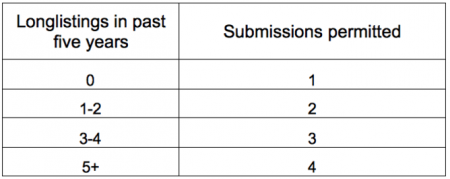July 30, 2015
2015 Man Booker Prize longlist announced
by Alex Shephard
Now in its second year of being open to authors of any nationality, as long as they’ve published in the UK, this year’s Man Booker Prize longlist is headlined by five Americans, contains three debut novelists, and features seven women and six men. Three British writers, including Tom McCarthy, also made the cut; the other five writers hail from Jamaica, India, Ireland, Nigeria, and New Zealand. It’s a diverse list, in other words, featuring both established authors like Marilynne Robinson, Anne Tyler, and Anne Enright alongside rising stars Hanya Yanagihara, Laila Lalami, and Marlon James.
The full longlist is here, via PublishersWeekly:
- Bill Clegg (US) Did You Ever Have a Family (Gallery/Scout Press)
- Anne Enright (Ireland) The Green Road (Norton)
- Marlon James (Jamaica) A Brief History of Seven Killings (Riverhead)
- Laila Lalami (US) The Moor’s Account (Pantheon)
- Tom McCarthy (UK) Satin Island (Knopf)
- Chigozie Obioma (Nigeria) The Fishermen (Little, Brown)
- Andrew O’Hagan (UK) The Illuminations (FSG)
- Marilynne Robinson (US) Lila (FSG)
- Anuradha Roy (India) Sleeping on Jupiter (MacLehose Press, Quercus)
- Sunjeev Sahota (UK) The Year of the Runaways (Knopf)
- Anna Smaill (New Zealand) The Chimes (Sceptre)
- Anne Tyler (US) A Spool of Blue Thread (Knopf)
- Hanya Yanagihara (US) A Little Life (Doubleday)
Gallery is an imprint of Simon & Schuster; Riverhead, Knopf and Doubleday are imprints of Penguin Random House; Little, Brown and Quercus are part of the Hachette family; FSG is part of Macmillan. Sceptre is UK only, but it’s an imprint of Hodder & Stoughton, whose parent company is… Hachette. Norton, meanwhile, is employee-owned. Last year, the story was similar: five of the six shortlisted books were published by Penguin Random House UK.
It hasn’t always been like this—or at least it hasn’t always been quite this bad. As Stevie Marsden notes in an excellent piece in The Conversation, things started to change drastically after the Man Booker Prize changed its rules to allow entries from the U.S., as well as the U.K. and British Commonwealth countries last year. Here’s Marsden on how the nomination process worked before 2014:
“The previous rule was that all UK publishers were entitled to enter two full-length novels along with a list of up to five other titles. Each title from this next best five had to be accompanied by a 250-word “justification for submission”, written and signed by the book’s editor. From these additional lists, the judges were invited to call in “no fewer than eight and no more than 12” books for adjudication for the prize.”
The expansion of the prize meant a rule change, however. In an attempt to limit submissions, the Man Booker Prize Committee changed the rules. Now, how many titles you can submit for consideration depends on past performance:
Corporate conglomerate publishers have dominated the prize for some time, so the new system is rigged in their favor. Here’s Marsden again on what the new rules mean:
Of the 75 books longlisted between 2010 and 2015, 23 came from imprints from Penguin and Random House (the two publishers merged in 2013 to become Penguin Random House). Penguin Random House’s fellow conglomerate publishers have also been extremely successful over this period. Hachette (Hodder & Stoughton, Sceptre, Virago and Headline Review) has received nine listings. Holtzbrinck, owner of Pan Macmillan, and News Corporation, owner of Harper Collins, have received seven and five respectively.
That leaves 31 nominations spread among the independents. That might not sound like overwhelming dominance, but it means that the conglomerates are entitled to submit significantly more entries than other publishers. Much of this is to do with their imprints. In the past five years, seven of the Penguin Random House imprints have been listed. All but two have received two or more longlistings, with Chatto & Windus taking the lead with five books longlisted over the five-year period.
According to the new rules, this means that Penguin Random House can submit 17 books next year for the prize. Compare this to successful independent publishers such as Faber & Faber or Canongate. Faber & Faber received its fourth longlisting in five years this year, so will be entitled to submit up to three books for the Man Booker next year. Canongate has been longlisted twice and will be eligible to submit just two books. As for new or smaller independent publishers which have never been longlisted in the past five years, they are only entitled to submit one book.
The result is a microcosm for the publishing world at large: it’s not only dominated by corporate publishing, but the rules themselves seemed to be written to the benefit of corporate publishers. This year’s longlist is strong and diverse but the Man Booker Prize’s global ambition will never be reached unless it makes an effort to acknowledge small, independent presses.
Alex Shephard is the director of digital media for Melville House, and a former bookseller.

